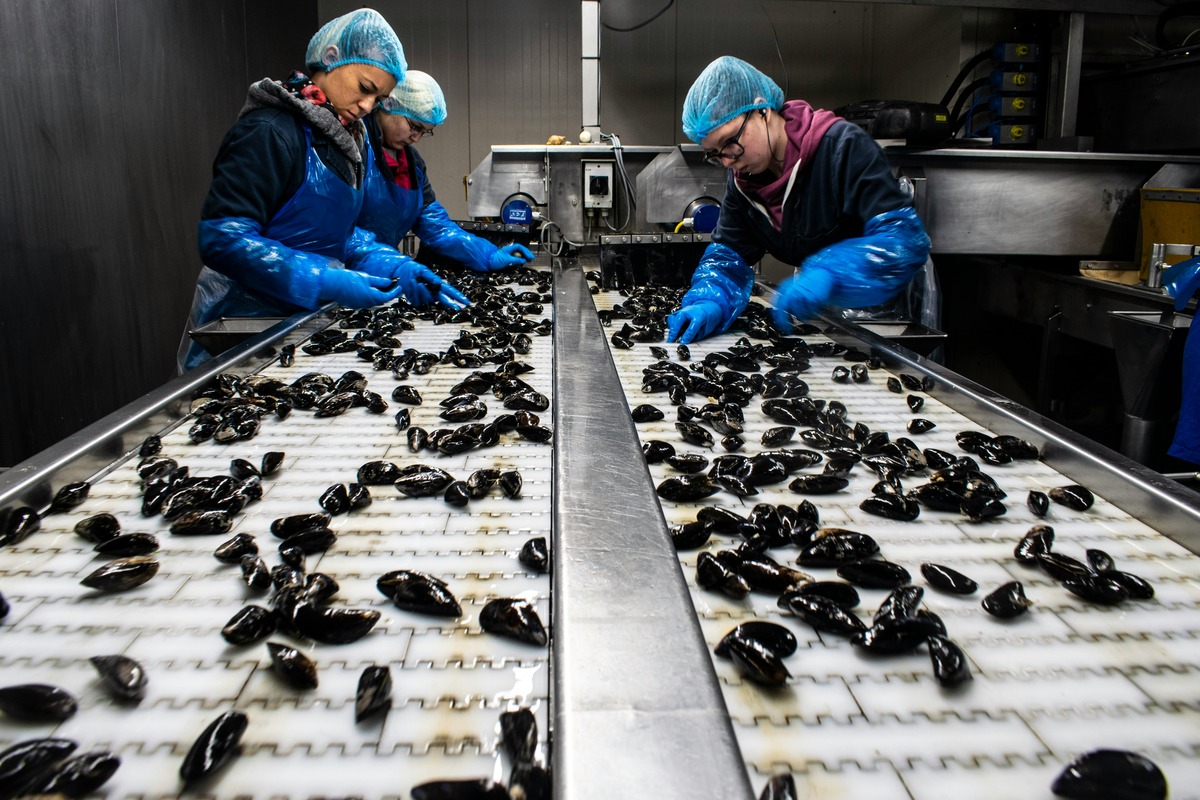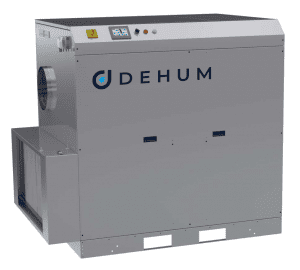
The Importance Of Humidity Control To The Food And Drink Industry
May 2, 2024
Food and Drink Industry
Food & drink is the UK’s biggest manufacturing sector by turnover, contributing more to the economy than any other. Such a large industry requires a lot of factories, transportation, and storage. All of which require quality dehumidification to keep our food and drink fresh. So what is the Importance Of Humidity Control To The Food And Drink Industry?
How big is the food and drink industry in the UK?
As well as contributing over £100b GVA to the economy per year, the food and drink industry employs over half a million people across all regions of the UK. The majority of these workers are in factories, where workforces can range from small teams to hundreds working on multi-site organisations.
Food production is much bigger than drink, accounting for over 80% of sales in the industry. There are a wide variety of foods being produced and processed too, from chocolatey confectionery to fresh fruit.
The demand for food and drink is only increasing, putting these factories under huge pressure to maximise their output. But this can’t come at the cost of quality; factory owners need to produce better quality products, at a faster rate, to stay one step ahead of their competitors.
If the conditions aren’t perfect on the production line, huge batches of food and drink can be ruined, costing time and a lot of money. To ensure that this doesn’t happen, you need quality dehumidification systems.
How Humidity affects Food and Drink Production
Depending on the food or drink being produced, humidity can have different effects. These include:
- Clumping
- Mould and fungal growth
- Melting
- Dryness
- Condensation
- Ineffective storage
- Handling issues
- Transportation problems
Humidity issues can be a nightmare to detect without the best equipment and is therefore often overlooked as the reason why production is being affected or even halted.
Naturally, not all produce will have all of the issues we listed above, so let’s break down how different types of food production can be affected by humidity.
 How Humidity affects Confectionary
How Humidity affects Confectionary
A combination of humidity and sugar can often leave confectionery manufacturers in a sticky mess. Sugar can be unpredictable at the best of times and is very sensitive to any excess moisture in the air.
Both baking and drying are crucial parts of the confectionary production process. If the temperatures aren’t 100% correct, sweets can melt, clump together, or dry much faster than they should.
Our systems not only help you to control the amount of humidity in the air, they’re also crucial for keeping temperatures at optimal levels. From pan-coating chocolate to stove-drying jelly and foam sweets, the cutting-edge solutions and equipment we provide are a necessity in any confectionery manufacturing plant.
How Humidity affects Snack Production
In a similar vein to confectionery, creating snack foods needs precise humidity control. Too much moisture and food that should be crunchy becomes soggy, too little and they crumble to dust in the packet.
From breakfast bars to their lunchtime packet of crisps, we can give your products the crunch and texture that snack aficionados expect.
How Humidity affects Meat Curing

Anyone who’s accidentally left a packet of ham out on the countertop for too long knows the importance of keeping meat cool. But when it comes to meat production, curing meat in the right conditions is even more important.
Creating the perfect environment in which to cure meat isn’t easy but has to be done right. Bacon, salami, and other meat products all go through the curing process and if the humidity level is too low, the outside of the meat will dry out too quickly and moisture will become trapped inside, leading to spoilage.
If the humidity is too high, the meat will not dry properly, leading to mould and fungus developing. You don’t need us to tell you that shipping out spoiled meat will ruin your reputation.
The removal of too much water could also result in the end product being underweight. It’s a lot of hassle but becomes a low-humidity breeze with the right equipment.
Our systems are tailored to your needs, and your industry’s requirements. We’ll help you achieve the perfect drying environment for meat curing.
How Humidity affects Freezing and Food Storage
Storage is the most important part of any food or drink production cycle. It doesn’t matter how good your production lines are; if the final product isn’t stored correctly, it’s all for nothing.
It’s the same for base ingredients too. Even if they don’t need to be frozen, storage areas need to have humidity control to prevent excess moisture from ruining food before its even made. And in the freezer, excess moisture means ice.
From spiral and blast freezers to cold storage and distribution, ice is a preventable problem. Our systems have extended defrost cycles that not only reduce ice build-up, but also make cold stores and distribution centres more energy-efficient and safer places to work.
With a Dehum system in place, you never have to worry about ineffective storage affecting your output.
How Humidity affects Fruit and Veg
There’s nothing quite like a freshly picked strawberry, or a carrot that was pulled out of the ground a few hours ago. If left alone, fruit and vegetables don’t stay fresh for long, especially after a lengthy journey along the production line.
Factories pull out all the stops to keep the fruit and veg you buy as fresh as possible. From field to freezer, controlling humidity is vital to achieving this goal.
Our systems help ensure that the strawberry in your Eton Mess, the cucumber on your sandwich, and the peas on your Sunday roast are as fresh as the day they were picked.

How Humidity affects Powder Milling and Handling

It may sound obscure to someone not in the food production world, but powder milling is big business, and needs to be done well.
The milling of ingredients is the breaking down of a large material into a very fine powder. In doing this the surface area is exponentially increased and at the same time increases its ability to absorb the moisture in the air around it.
This can create havoc in the handling process, where the powder can start to stick and clump together and make silo blocks, conveyor line blocks, and bulk containers solid. Any of these issues can bring processing and manufacturing to a grinding halt.
Our industrial dehumidifiers help to control the amount of moisture powder can absorb, preventing any blockages and keeping everything running smoothly.
What Causes Humidity issues in Food Production?
Humidity is important for food and drink production, but it must be at the correct levels. Benefits of controlled humidity include:
- Preventing surface drying
- Preventing evaporative losses
- Preventing static
- Supressing pollutants in the air
- Providing air cooling
- Condensation control
Humidity isn’t the enemy. We help you use it to your advantage, not just get rid of it. It can also improve the conditions for your workers too, keeping them safe and comfortable without sacrificing efficiency.
Even if you have dehumidifiers already in place, they may be causing you more harm than good. You may have been using the same equipment for years, with no issues whatsoever, but suddenly batches are being ruined. This could be due to the machines needing cleaning, repairs, or an adjustment to keep them working at their best.
Like your food and drink, dehumidifiers have a shelf life too. Our machines not only work better for longer but are also easier to maintain if they’re not on tip-top form.
The time of year can be a factor that affects humidity levels too. In summer, when the air is more naturally humid, you need to make sure your machines adapt to it and continue regulating humidity. Our dehumidifiers can be adjusted at any time, and constantly inform you of the humidity levels, temperature, and conditions of the production line. This means you can prevent issues before they happen.
Why Choose Dehum for Industrial Dehumidifiers?
 In an industry as large and important as food and drink production, you can’t afford to leave anything to chance. Thankfully, it’s an industry we have over 20 years’ experience working with, and can help you maximize your production, storage, and processing.
In an industry as large and important as food and drink production, you can’t afford to leave anything to chance. Thankfully, it’s an industry we have over 20 years’ experience working with, and can help you maximize your production, storage, and processing.
We have been behind some truly exciting and innovative new technologies, which have virtually eliminated many of the issues that uncontrolled humidity can cause.
If you need help with your food or beverage manufacturing process or have any questions about us and what we do, please visit our website www.dehum.com or call 01926 882624.
We look forward to hearing from you.
FAQs
What is the use of dehumidifier in food industry?
Controlling humidity is crucial the food and drink industry. If there is too much moisture in the air, it can be absorbed by food and ruin it, or if there is too little, it will become dry and tasteless.
What is a dehumidifier for snacks?
Snacks need to have humidity control in order for them to remain crunchy. If they absorb moisture, they become soggy. Dehumidifiers are used in snack factories to control this, and make sure that snacks are perfect every time.
Do dehumidifiers use a lot of electricity?
Industrial dehumidifiers do use a lot of power, but some are more efficient than others. Our systems were designed with energy preservation in mind, making them much cheaper to run in the long term.
How do I choose an industrial dehumidifier?
You should never skimp on your dehumidifiers. The best quality systems give you more control and monitoring than others, as well as working better for longer. Some are specifically designed for some industries, giving you the best results.
How long can you run an industrial dehumidifier?
Quality industrial dehumidifiers are designed for continuous running, making them perfect for factories. They can manage their power too, making them as energy efficient as possible without affecting production.
 How Humidity affects Confectionary
How Humidity affects Confectionary








